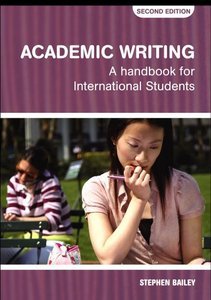
Academic writing can be pretty scary to foreign students learning at middle colleges and universities. And true, all courses carry expansive written assessments; this implies exceptional writing skills are mandatory. Academic Writing is a new-approach writing course for all international students whose coursework and exams are written in English. It is a practical text detailing all the writing processes and skills.
Academic Writing is clearly organized into four sections, allowing both teachers and students to make quick reference for all writing tasks. The four parts are split into short sections having explanations, diagrams and practice exercises, suitable for classroom use or self-study.
The first part deals with the writing process including writing foundations, reading and note making and the writing stages. It guides the students from the initial stage of interpreting the writing task right to transforming the writing problem to a final comprehensive essay. The section tackles delicate issues like how to avoid plagiarism and even subtle ones like Evaluating texts and selecting key points. It deals with fastidious essay planning, from organizing paragraphs to writing introductions and from crafting conclusions to rewriting and proof-reading. The section also deals with note-making, paraphrasing, summary writing and combining sources.
The second section of Academic Writing covers elements of writing. These are the skills that are needed for most academic writing assignments, such as making comparisons, giving examples and opening paragraphs. Some of the tasks that send student writers grinning, like cohesion, definitions of terms, making References and Quotations are also carefully handled here. This section builds from the first one as it digs deeper into the intricate contents of the writing sections dealt with in the latter. The part also introduces style, which gives the writer a unique identity. Elusive skills like sentence variation in sentence length and handling visual devices such as graphs and tables are well illustrated in this section.
Accuracy in writing comes third, giving remedial practice in those areas that writing students mostly find confusing. These include the use of articles, passives or prepositions. For many students, this part will make the most frequent reference stopover. It actually unearths all the major daunting elements of grammar, becoming an antidote for the common syntax errors student make unknowingly. And most importantly it handles academic vocabulary, which key to any academic writing assignment.
The last part offers writing models, which enshrine the practical use of the skills offered in the entire book. There are those writing models such as CVs, survey reports, letters and essays. The layout and phrasing for these models become handy for those who want to try academic writing in real life. Comparison essay and discussion essay are also illustrated here for those who wish to compare.
Any international student wishing to hone his or her writing skills will find this comprehensible guide to academic writing truly indispensable and readily adaptable for both long and short courses. The writing tests and a comprehensive answer key at the end all add to the rich experience you can get from this book. Cross-referencing also comes handy for quick access to information.
About the Author:
Lily Wilson is a 34 year-old homestay freelance academic writer. Lily runs her personal blog AnAwfulLotofWriting and works as a contributing academic writer at ThePensters.com.